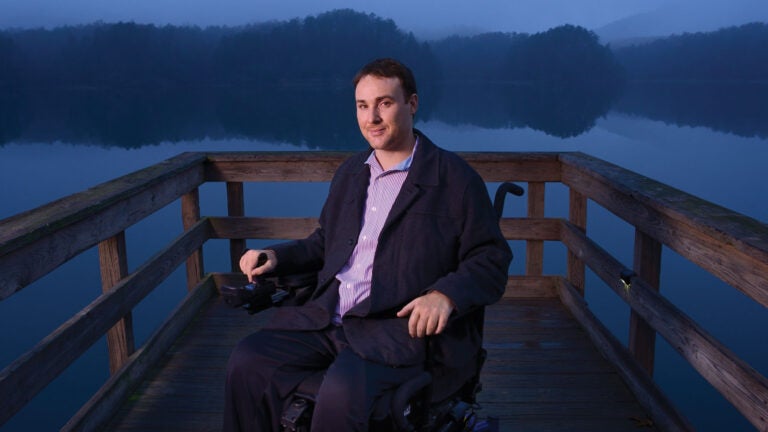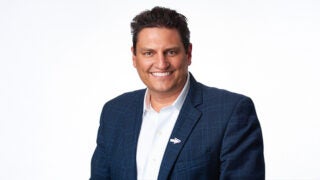
Ryan Williams at one of his favorite places, Carvins Cove Reservoir in Virginia (Photo/Jim Stroup)
Physical limitations don’t hold back a former USC doctoral student
Ryan Williams, a quadriplegic, lands his dream job at Virginia Tech
Ryan Williams PhD ’14 has long defied the odds.
After suffering from a freak surfing accident in 2008 that left him a quadriplegic with no use of his legs and limited use of his arms, the then-USC Viterbi School of Engineering PhD student resisted the temptation to withdraw into himself. Instead, Williams redoubled his academic efforts, his physical limitations notwithstanding.
Returning to his native Roanoke, Va., Williams continued to take classes through DEN@Viterbi, USC Viterbi’s award-winning distance-learning program. Williams communicated with professors via Skype or email, painstakingly typing 25 to 30 words a minute by putting his right hand in a brace with a pencil at the end. He worked late into the night reading articles and writing research papers about how multi-agent systems interact intelligently and autonomously.
In May 2014, a beaming Williams received a rousing ovation at the PhD commencement ceremony when he collected his diploma.
“Either you let something like this destroy you or you destroy it,” the ever-optimistic Williams said. “In my battle against health, I’m going to win. I am winning.”
Indeed, he is.
This August, Williams will return to his undergraduate alma mater of Virginia Tech University as a tenure-track assistant professor in the Bradley Department of Electrical and Computer Engineering.
He hopes to build a successful lab, mentor graduate students and collaborate with distinguished scholars from around the world. Williams also looks forward to deepening his research on systems that collaborate over large-scale autonomous systems — work that could one day have practical applications for sensor networks, robotic systems and wireless networks.
“There’s something really special about coming back to Virginia Tech and contributing to the community in a real way,” said Williams, whose late mother and brother also earned degrees there.
Challenges ahead
The university chose Williams over about 50 other candidates, said Luke Lester, chair of Virginia Tech’s Bradley Department of Electrical and Computer Engineering. “His intellectual depth, teaching skills and research potential were head and shoulders above everyone else,” Lester said. “We’re so happy to get him.”
Still, Williams faces several unique challenges.
His father or brother must take him to campus in a specially outfitted van because he cannot drive. Even though Williams experiences near constant discomfort, he eschews pain meds, fearing that they could dull his mind. Extreme fatigue, a byproduct of his injury, plagues him daily. Travel to international conferences exacts an enormous physical toll.
Williams prefers to focus on the positive, including his experiences as a Trojan. Not only did his professors intellectually shape him, he said, but their long-standing support, even after he earned his doctorate, helped him land his dream job at Virginia Tech.
Ryan is an inspiration to all of us.
Gaurav Sukhatme
After graduating from USC Viterbi, Williams worked as a “non-traditional postdoc” with his PhD adviser, Gaurav Sukhatme, chair of the Department of Computer Science. Sukhatme helped Williams make academic connections; critiqued his research, which included 10 authored or co-authored academic papers; and encouraged Williams to persevere.
Sukhatme couldn’t be prouder of his former student’s achievements.
“Ryan is an inspiration to all of us. His dedication and drive are awe-inspiring,” Sukhatme said. “I’m so proud of all his achievements, and I look forward to great things from him in the future.”



